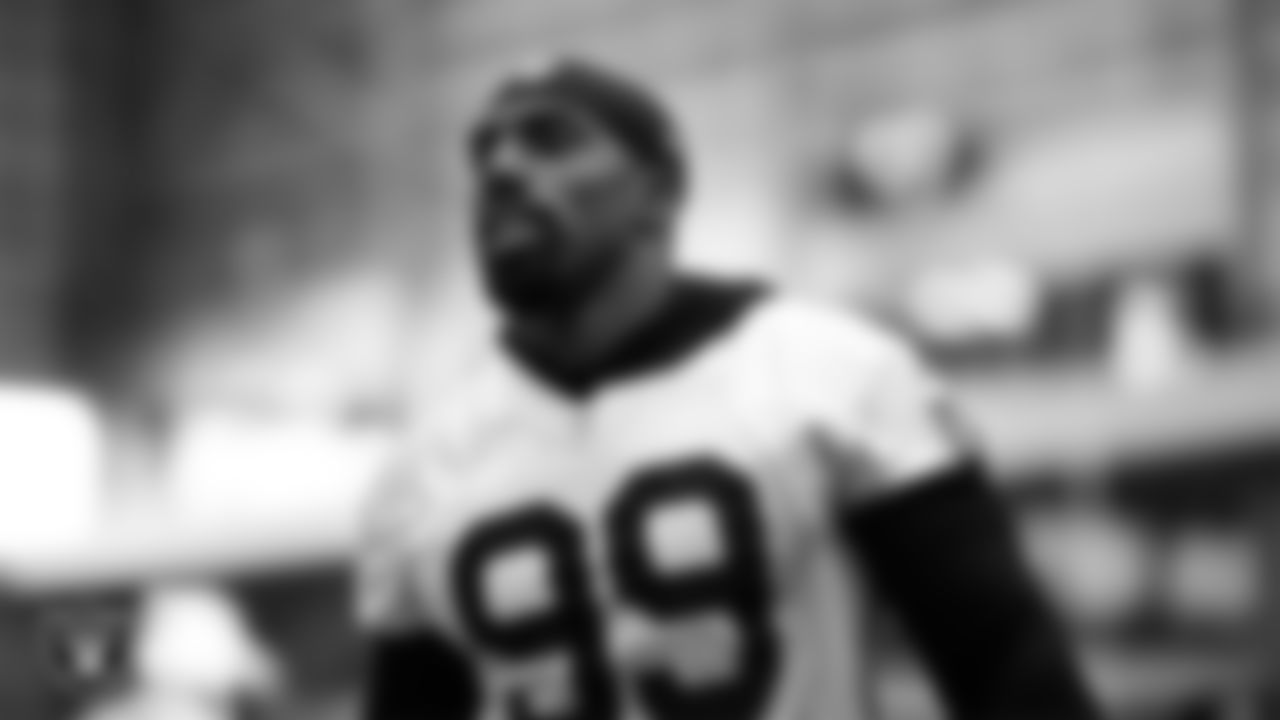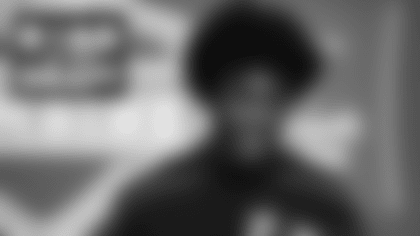Perception isn't always reality.
Especially in the NFL. Because let's be honest, it seems like a pretty damn cool gig.
It's a league filled with world-class athletes that get to travel the world playing football and entertain millions of fans that are in admiration of their abilities. And those players will also be the first to tell you they are living out their dreams.
But with those dreams comes overwhelming pressure and sometimes, nightmares that can take a physical and mental toll.
Early mornings and late nights, highly competitive atmospheres, frequently relocating with your family across the country. Not to mention living life in the public eye, with your life's work judged and criticized on a daily basis by coaches, front office staff, media pundits and fans.
"It's a daily grind. A lot of people in a lot of different scenarios," Devin White said of playing in the NFL. "For myself, I'm away from my kids every day. They're going to school in a different state. I barely get to see them [in season]. I think that's pretty hard.
"Just mentally, there's wear and tear. Being strong when you're fighting injuries. You've got to be strong but you want play well, you want to help the team."

Raiders + Allegiant Stadium App
Download our official Raiders + Allegiant Stadium app for team & stadium modes, content, alerts and manage your tickets.
With October 10 being World Mental Health Day, it's more vital than ever to shine light on prioritizing the mind as well as the body for athletes. The NFL, in conjunction with the NFLPA, has in recent years put forth an initiative to de-stigmatize mental health issues.
In a study conducted by the NFLPA with 2,552 current and former players, 11.1% of members reported suffering from depression. This is nearly 5% more than the average of adult men that suffer a major depressive episode, according to the National Institute of Mental Health.
In 2019, the NFLPA formed the Comprehensive Mental Health and Wellness Committee, which develops programs and resources for players, coaches, club personnel and players' family members regarding mental health and wellness. With this agreement, it requires each team to retain a Behavioral Health Team Clinician that's solely focused on supporting players' emotional and mental health and well-being.
The NFLPA Total Wellness Program has also been a benefit for players across the league, providing resources and education to players at every stage of the player life cycle. This includes retired NFL players or rookies like Ashton Jeanty who can partake in the Rookie Transition Program with the purpose of helping draftees and UDFAs acclimate to life in the league.
"I've been preparing for this moment and there's just certain things that come with it," Jeanty told Raiders.com. "Whether that's the media talking about you, good or bad, the expectations on you are always going to be high. But that's what you want, that's what I've worked for – to be in this position. I think for me, it's just perspective. I prayed for this, I asked for this, so it's just a learning process every day.
"I think for me, it's getting separation from football when I need it," Jeanty added of how he mentally decompresses. "Mediating, taking a deep breath, relaxing, listening to music. Don't get consumed on the game and everything that it takes to be a great player. Just be in the moment. When you're at practice, be in the moment. When you're in meetings, be in that moment. When you're away from the game at home, be in that moment."
Quarterback Geno Smith, arguably playing the most stressful position, has also used perspective to provide sanity and clarity. He's been an advocate for mental health dating back to his time with the Seattle Seahawks. His journey to the Raiders has been untraditional, on the trajectory to being a career backup following his time with the New York Jets.
After linking up with Pete Carroll in Seattle, he became the starter in 2022 and went on to earn a Pro Bowl nod and win NFL Comeback Player of the Year while taking the Seahawks to the playoffs.
His advice to young players dealing with similar obstacles: "Block out the outside noise."
"I've said many times, 'My toughest days are someone else's dream,' and a lot of people would trade to be in our shoes, even where we are right now," Smith said. "And mentally, you've got to gain that perspective. You've got to be a mature adult about your emotions. You've got to find life outside of football as well. You never want to put all your eggs in one basket. I think a lot of guys struggle to transition after football because we devote so much time to this. But this is what we do, not exactly who we are."
"I talk to God. I'm big on my faith, reading my Bible and just always trying to connect myself with the higher power," Smith added. "And then my mother, my father, brothers, sisters, my teammates. I mean, I have a great support group around me. And I think when you think about going through things, I don't think I went through anything. I've been in the NFL the whole time, so there's not much that I've gone through. The reality is, it's all your perception. So, whether or not you think it's something or you think it's nothing, it's just how you look at it."
Devin White has also spoken out about mental health journey, learning throughout his NFL career that vulnerability isn't a weakness.
"I would probably tell myself that I don't have to be the strongest in the room," he said of the advice he'd give his younger self. "It takes courage to show vulnerability and be able to lean on others just as you allow others to lean on you. Reap what you give out and talk to other people."
If you or someone you know is struggling with their mental health, click here to find resources to get help.
Head inside Intermountain Health Performance Center to view the best photos from the Silver and Black's Friday practice.

Las Vegas Raiders long snapper Jacob Bobenmoyer (50) during practice at Intermountain Health Performance Center.

Las Vegas Raiders center Will Putnam (67) walks out to the field for practice at Intermountain Health Performance Center.

Las Vegas Raiders tackle Dalton Wagner (78) walks out to the field for practice at Intermountain Health Performance Center.

Las Vegas Raiders center/guard Jordan Meredith (61) walks out to the field for practice at Intermountain Health Performance Center.

Las Vegas Raiders quarterback Cam Miller (5) walks out to the field for practice at Intermountain Health Performance Center.

Las Vegas Raiders defensive end Maxx Crosby (98) in the weight room during practice at Intermountain Health Performance Center.

Las Vegas Raiders assistant defensive line coach Kenyon Jackson in the weight room during practice at Intermountain Health Performance Center.

Las Vegas Raiders defensive tackle JJ Pegues (92) in the weight room during practice at Intermountain Health Performance Center.

Las Vegas Raiders wide receiver Tre Tucker (1) walks out to the field for practice at Intermountain Health Performance Center.

Las Vegas Raiders strength and conditioning assistant Deuce Gruden, defensive tackle JJ Pegues (92), linebacker Tommy Eichenberg (44) and nutrition assistant Tevin Duncan in the weight room during practice at Intermountain Health Performance Center.

Las Vegas Raiders tackle Dalton Wagner (78) in the weight room during practice at Intermountain Health Performance Center.

Las Vegas Raiders guard Atonio Mafi (56) in the weight room during practice at Intermountain Health Performance Center.

Las Vegas Raiders center/guard Jordan Meredith (61) in the weight room during practice at Intermountain Health Performance Center.

Las Vegas Raiders linebacker Cody Lindenberg (55) in the weight room during practice at Intermountain Health Performance Center.

Las Vegas Raiders linebacker Cody Lindenberg (55) in the weight room during practice at Intermountain Health Performance Center.

Las Vegas Raiders center Jackson Powers-Johnson (58) during practice at Intermountain Health Performance Center.

Las Vegas Raiders guard Alex Cappa (65) during practice at Intermountain Health Performance Center.

Las Vegas Raiders defensive tackle Jonah Laulu (96) during practice at Intermountain Health Performance Center.

Las Vegas Raiders wide receiver Justin Shorter (88) during practice at Intermountain Health Performance Center.

Las Vegas Raiders wide receiver Jakobi Meyers (16) during practice at Intermountain Health Performance Center.

Las Vegas Raiders wide receiver Shedrick Jackson (4) during practice at Intermountain Health Performance Center.

Las Vegas Raiders tight end Carter Runyon (46) during practice at Intermountain Health Performance Center.

Las Vegas Raiders linebacker Jamin Davis (48) during practice at Intermountain Health Performance Center.

Las Vegas Raiders safety Isaiah Pola-Mao (20) during practice at Intermountain Health Performance Center.

Las Vegas Raiders defensive tackle Thomas Booker IV (99) during practice at Intermountain Health Performance Center.

Las Vegas Raiders defensive tackle Leki Fotu (95) during practice at Intermountain Health Performance Center.

Las Vegas Raiders safety Jeremy Chinn (11) during practice at Intermountain Health Performance Center.

Las Vegas Raiders wide receiver Tre Tucker (1) during practice at Intermountain Health Performance Center.

Las Vegas Raiders safety Isaiah Pola-Mao (20) during practice at Intermountain Health Performance Center.

Las Vegas Raiders punter AJ Cole (6) during practice at Intermountain Health Performance Center.

Las Vegas Raiders wide receiver Jack Bech (18) during practice at Intermountain Health Performance Center.

A hat on the field during practice at Intermountain Health Performance Center.

Las Vegas Raiders quarterback Geno Smith (7) during practice at Intermountain Health Performance Center.

Las Vegas Raiders guard Dylan Parham (66) during practice at Intermountain Health Performance Center.

Las Vegas Raiders offensive coordinator Chip Kelly and Head Coach Pete Carroll during practice at Intermountain Health Performance Center.

Las Vegas Raiders defensive end Maxx Crosby (98) during practice at Intermountain Health Performance Center.

Las Vegas Raiders defensive end Malcolm Koonce (51) during practice at Intermountain Health Performance Center.

Las Vegas Raiders defensive tackle Jonah Laulu (96) during practice at Intermountain Health Performance Center.

Las Vegas Raiders defensive tackle JJ Pegues (92) during practice at Intermountain Health Performance Center.

Las Vegas Raiders defensive end Jahfari Harvey (91) during practice at Intermountain Health Performance Center.

Las Vegas Raiders cornerback Decamerion Richardson (25) during practice at Intermountain Health Performance Center.

Las Vegas Raiders cornerback Decamerion Richardson (25) during practice at Intermountain Health Performance Center.

Las Vegas Raiders cornerback Darien Porter (26) during practice at Intermountain Health Performance Center.

Las Vegas Raiders cornerback Eric Stokes (22) during practice at Intermountain Health Performance Center.

Las Vegas Raiders defensive tackle Thomas Booker IV (99) during practice at Intermountain Health Performance Center.

Las Vegas Raiders wide receiver Justin Shorter (88) during practice at Intermountain Health Performance Center.

The Las Vegas Raiders huddle during practice at Intermountain Health Performance Center.

Las Vegas Raiders quarterback Cam Miller (5) during practice at Intermountain Health Performance Center.

Las Vegas Raiders quarterback Cam Miller (5) during practice at Intermountain Health Performance Center.

Las Vegas Raiders quarterback Geno Smith (7) during practice at Intermountain Health Performance Center.

Las Vegas Raiders quarterback Kenny Pickett (15) during practice at Intermountain Health Performance Center.

Las Vegas Raiders quarterback Cam Miller (5) during practice at Intermountain Health Performance Center.

Las Vegas Raiders quarterback Cam Miller (5) during practice at Intermountain Health Performance Center.

Las Vegas Raiders quarterback Geno Smith (7) during practice at Intermountain Health Performance Center.

Las Vegas Raiders quarterback Geno Smith (7) during practice at Intermountain Health Performance Center.

Las Vegas Raiders quarterback Cam Miller (5) during practice at Intermountain Health Performance Center.

Las Vegas Raiders quarterback Geno Smith (7) during practice at Intermountain Health Performance Center.

Las Vegas Raiders quarterback Cam Miller (5) during practice at Intermountain Health Performance Center.

Las Vegas Raiders defensive end Maxx Crosby (98) during practice at Intermountain Health Performance Center.

Las Vegas Raiders defensive tackle Thomas Booker IV (99) during practice at Intermountain Health Performance Center.

Las Vegas Raiders defensive tackle Jonah Laulu (96) during practice at Intermountain Health Performance Center.

Las Vegas Raiders defensive end Tyree Wilson (9) during practice at Intermountain Health Performance Center.

Las Vegas Raiders defensive end Maxx Crosby (98) during practice at Intermountain Health Performance Center.

Las Vegas Raiders defensive tackle Jonah Laulu (96) during practice at Intermountain Health Performance Center.

Las Vegas Raiders defensive tackle Jonah Laulu (96) during practice at Intermountain Health Performance Center.

Las Vegas Raiders defensive tackle Thomas Booker IV (99) during practice at Intermountain Health Performance Center.

Las Vegas Raiders defensive end Tyree Wilson (9) during practice at Intermountain Health Performance Center.

Las Vegas Raiders defensive end Maxx Crosby (98) during practice at Intermountain Health Performance Center.

Las Vegas Raiders defensive end Maxx Crosby (98) during practice at Intermountain Health Performance Center.

Las Vegas Raiders defensive tackle Adam Butler (69) during practice at Intermountain Health Performance Center.

Las Vegas Raiders defensive tackle Thomas Booker IV (99) during practice at Intermountain Health Performance Center.

Las Vegas Raiders defensive tackle Leki Fotu (95) during practice at Intermountain Health Performance Center.

Las Vegas Raiders defensive end Malcolm Koonce (51) during practice at Intermountain Health Performance Center.














